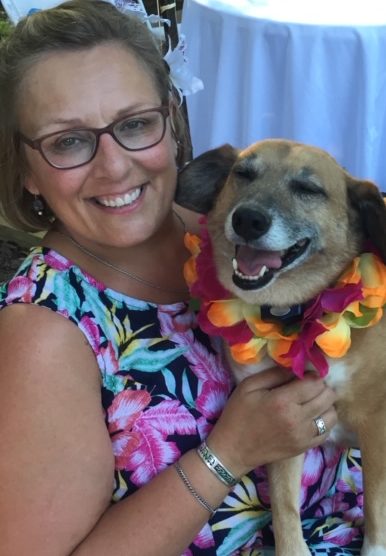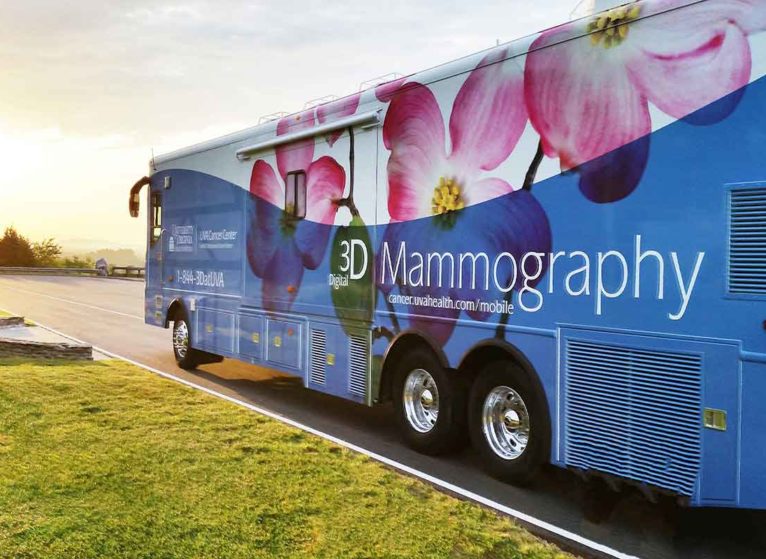Robane Beroza didn’t have a family history of breast cancer. She wasn’t high risk for the disease. Yet, the 59-year-old was still intent on getting a mammogram every year without fail. “Somewhere along the line it became part of my annual routine,” she says. “It was just one of those things I had in my mind as being really important.”
When a relocation to Ohio caused her to miss her mammogram one year, she jumped at the opportunity to be screened when she returned to Virginia. “I had just moved back. I was working at Plow & Hearth [in Madison County], and they told us the UVA Health mammography bus would be on site,” she says. “I was the first person to sign up and the first person on the bus. It was very quick and easy.”
Making Breast Screening Convenient
The Mobile Mammography Coach visits various locations throughout Virginia at different times each month, providing at least 25 breast screenings per day. “Our ability to bring women this service where they are is a great outreach tool, particularly for those patients who are in a rural environment or who may be compromised and unable to travel,” says radiologist Timothy Rooney, MD. “We are able to provide on-site screening to these patients without sacrificing quality.”
In fact, the mobile mammography unit is equipped with the same mammography technology available at the Breast Care Center. “We have 3D, state-of-the-art mammography at the clinic and on the road,” says Rooney. “It is the best tool we have.”
For Beroza, this advanced technology made all the difference. “I got a call the day after my screening and they asked me to come into the clinic. I went to UVA Health right away for a follow-up appointment and they did a biopsy,” she says. “All signs pointed to a positive diagnosis, but I had to wait for the results.”

A Proactive Plan to Treat Breast Cancer
UVA Health surgical oncologist Shayna Showalter, MD, diagnosed Beroza with invasive ductal carcinoma. This cancer begins in the milk ducts and accounts for about 80% of all breast cancers. “Dr. Showalter said: ‘I’ve seen a lot of these. It’s small. We can take care of it,’” says Beroza. “She was so reassuring and positive. And that’s the way I attacked it — I didn’t want to be scared, so I was proactive. We had a plan and we were going to work through it.”
Beroza’s treatment plan included lumpectomy surgery with reconstruction. After that, she had chemotherapy followed by radiation.
“The night before my first chemo treatment, my sister came down from Pennsylvania and we checked into a hotel so we could be at UVA first thing in the morning. But there was a huge snowstorm that night and everything shut down. I got myself all psyched up for treatment and then I couldn’t do it,” says Beroza. The therapy wasn’t delayed for long, however.
“Dr. [Patrick] Dillon didn’t want me to have to put it off another day, so he put on his boots and biked to work so I could get chemo,” says Beroza. “It went great and I felt very fortunate that I never got really sick.”
Beroza did lose her hair, however. She also had to give herself injections to boost her white blood cell counts. But she took these challenges in stride.
“A week after the first chemo treatment I cut my hair short in anticipation, and then I shaved off the rest,” she says. “I was bald as a cue ball, but I wore a lot of hats and scarves. When it grew back, it was curly and I’ve never had that before.”
Get a Mammogram Near You
Our Mobile Mammography Coach travels to sites across central Virginia.
Remission & a New Perspective
Now that she’s in the clear and the cancer is in remission, Beroza says she has a fresh perspective. “Things that are important are magnified and the little things just don’t matter,” she says.
One thing that is still important: annual mammograms. “I tell everyone to get a mammogram,” says Beroza. “My sister kept putting hers off because she was scared. But you just have to do it. You’re going to be OK.”

